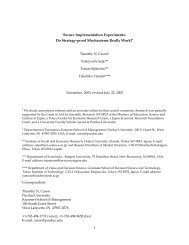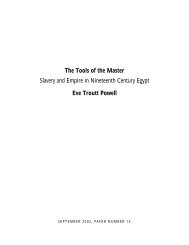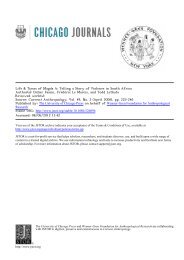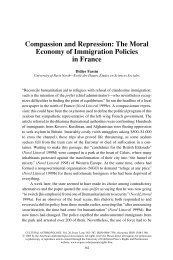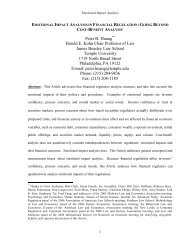Governance, Growth, and Development Decision-making - School of ...
Governance, Growth, and Development Decision-making - School of ...
Governance, Growth, and Development Decision-making - School of ...
Create successful ePaper yourself
Turn your PDF publications into a flip-book with our unique Google optimized e-Paper software.
tion, transplanting these institutions <strong>and</strong> policies cannot produce<br />
economic development in natural states. Economists typically conclude<br />
that natural states suffer from too much market intervention:<br />
control <strong>of</strong> markets, laws fostering monopolies <strong>and</strong> other rent-creating<br />
privileges, inadequate property rights, ineffective public goods<br />
provision, <strong>and</strong> incomplete markets. All this is true. The economists’<br />
natural prescription is to suggest that a country ‘reform;’ that they<br />
systematically adopt policies that mimic those in open access orders:<br />
less regulatory control, absence <strong>of</strong> monopolies, more secure property<br />
rights, improved public goods provision such as education,<br />
<strong>and</strong> more complete markets. Such an approach ignores the fact that<br />
natural states adopt limited access policies not just to maximize<br />
the incomes <strong>of</strong> the ruling elite, but because limited access policies<br />
address the problem <strong>of</strong> violence by giving individuals <strong>and</strong> groups<br />
with access to violence an incentive to cooperate. Policies from open<br />
access orders—universal, impersonal rights <strong>and</strong> rule <strong>of</strong> law—reduce<br />
the natural state’s ability to control violence. These changes threaten<br />
to make people worse <strong>of</strong>f, not better <strong>of</strong>f. Modern economics fails<br />
to underst<strong>and</strong> this because it assumes the problem away, implicitly<br />
<strong>making</strong> the Weberian assumption that the state has a monopoly on<br />
violence <strong>and</strong> does not use it to exploit citizens.<br />
An implication <strong>of</strong> the above is that the dynamics <strong>of</strong> social<br />
change for developing countries lies in the logic <strong>of</strong> the natural state,<br />
not in the logic <strong>of</strong> the transition. With few exceptions, most developing<br />
countries today do not meet the doorstep conditions. They are<br />
not in a position where elites can credibly deal with others through<br />
impersonal relationships in critical matters <strong>of</strong> economic <strong>and</strong> political<br />
interactions. Transitions to well-defined elite rights are not<br />
sustainable under such conditions. The transfer <strong>of</strong> institutions from<br />
open access orders to natural states cannot, in <strong>and</strong> <strong>of</strong> itself, produce<br />
political <strong>and</strong> economic development. Indeed, to the extent that institutional<br />
forms are forced onto societies by international or domestic<br />
pressure but do not conform to existing beliefs about economic,<br />
political, social, <strong>and</strong> cultural systems, the new institutional forms are<br />
likely to work less well than the ones they replace.<br />
Douglass North, John Wallis, <strong>and</strong> Barry Weingast 15



